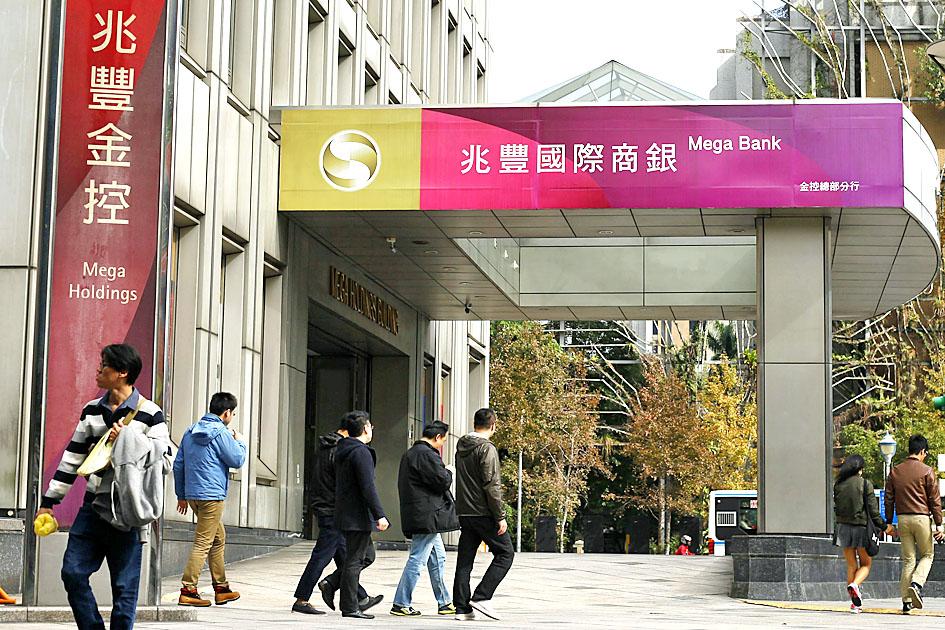State-run Mega International Commercial Bank (兆豐銀行), the main subsidiary of Mega Financial Holding Co (兆豐金控), yesterday said it aims to strengthen mortgage operations this year, as the business helps boost credit card customers and fund sales.
The lender’s mortgage operations last year spiked 64 percent year-on-year to NT$120 billion (US$4.24 billion), carrying its retail banking to second place among domestic peers, despite sharp competition, Mega Bank said.
Mega Bank attributed the achievement to its successful targeting of customers with real demand, namely first-time home buyers and those with relocation needs.

Photo: Ritchie B. Tongo, EPA-EFE
Mortgage borrowers tend to have long-term relationships with banks and have demonstrated a keen interest in credit card usage, mutual funds, foreign currencies and other financial products and services, Mega Bank said.
Mortgage customers accounted for NT$6.1 billion of fund sales last year, the highest in three years, while contributing NT$2.3 billion in credit card spending, the lender said, adding that 70 percent of mortgage customers own Mega Bank credit cards.
The central bank’s selective credit controls are favorable for the health of the mortgage market, as they require higher capital for property development and multiple home purchases, the lender said.
Mega Bank said it would beef up mortgage operations by increasing its number of clients aged 39 or younger, adding that first-time home buyers underpin this group with an average loan demand of NT$8 million.
The lender would support the government’s program to provide young home buyers with preferential interest rates and make its online services more user-friendly, it said.

South Korea’s equity benchmark yesterday crossed a new milestone just a month after surpassing the once-unthinkable 5,000 mark as surging global memory demand powers the country’s biggest chipmakers. The KOSPI advanced as much as 2.6 percent to a record 6,123, with Samsung Electronics Co and SK Hynix Inc each gaining more than 2 percent. With the benchmark now up 45 percent this year, South Korea’s stock market capitalization has also moved past France’s, following last month’s overtaking of Germany’s. Long overlooked by foreign funds, despite being undervalued, South Korean stocks have now emerged as clear winners in the global market. The so-called “artificial intelligence

‘SEISMIC SHIFT’: The researcher forecast there would be about 1.1 billion mobile shipments this year, down from 1.26 billion the prior year and erasing years of gains The global smartphone market is expected to contract 12.9 percent this year due to the unprecedented memorychip shortage, marking “a crisis like no other,” researcher International Data Corp (IDC) said. The new forecast, a dramatic revision down from earlier estimates, gives the latest accounting of the ongoing memory crunch that is affecting every corner of the electronics industry. The demand for advanced memory to power artificial intelligence (AI) tasks has drained global supply until well into next year and jeopardizes the business model of many smartphone makers. IDC forecast about 1.1 billion mobile shipments this year, down from 1.26 billion the prior

People stand in a Pokemon store in Tokyo on Thursday. One of the world highest-grossing franchises is celebrated its 30th anniversary yesterday.

Chinese artificial intelligence (AI) start-up DeepSeek’s (深度求索) latest AI model, set to be released as soon as next week, was trained on Nvidia Corp’s most advanced AI chip, the Blackwell, a senior official of US President Donald Trump’s administration said on Monday, in what could represent a violation of US export controls. The US believes DeepSeek will remove the technical indicators that might reveal its use of American AI chips, the official said, adding that the Blackwells are likely clustered at its data center in Inner Mongolia, an autonomous region of China. The person declined to say how the US government received